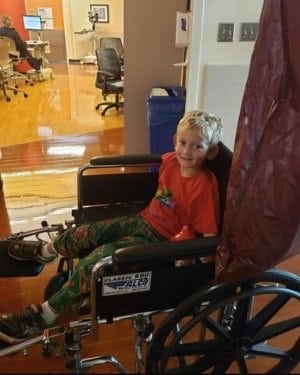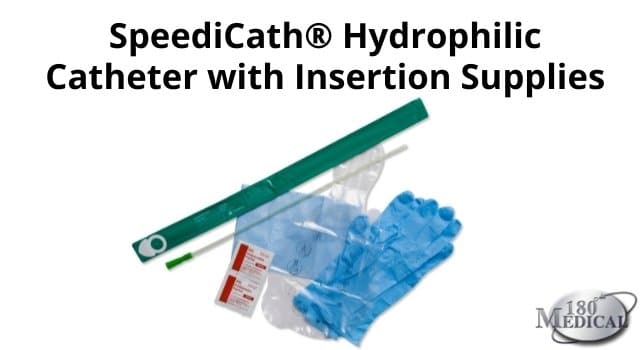
180 Medical proudly serves a diverse community of individuals living with all kinds of conditions and diagnoses. We’re there to support them through all their challenges and ensure they have the products they need for a better quality of life. Every day, customers like you inspire us, and that’s why we love sharing real stories from real people in the 180 Medical community.
Oliver is one of the young rock stars in our community, and his mother, Kim, and father, Scott, have generously shared his journey.

Welcome to the World, Baby Oliver
Oliver’s parents, Scott and Kim, always knew they wanted children. At 38 years old, Kim found out the exciting news that she was pregnant. Finally, they were growing their family.
At Kim’s 20-week ultrasound, the doctor found something unusual and asked that she come back in 6 weeks. 6 weeks came and went, and they received some scary news.
Little Oliver had Posterior Urethral Valve Syndrome. This meant that his urethra was blocked, which would prevent the outflow of urine. Kim’s doctor referred them to a pediatric urologist who would let them know what to expect and how to move forward. Kim and Scott prepared themselves with as much knowledge as possible to prepare for the arrival of their baby boy.

Oliver was born at 36 weeks, weighing 6 lbs. 11 oz. His parents were overjoyed at the arrival of their baby boy.
Thankfully, since his doctors and parents were already aware of Oliver’s condition, they were prepared. The very next day, Oliver had his first surgery to remove the obstructed urethral valve.
After the procedure, Scott and Kim got to take their baby home, knowing he faced a lifelong journey.
Oliver’s Urological Issues Lead to Mitrofanoff Procedure
Oliver began getting UTIs regularly at around three months old and wasn’t able to urinate regularly. Doctors decided the best option would be to create a stoma to divert the flow of his urine. They attached his ureters (the tubes leading from the kidneys to the bladder) to the abdomen, which would allow him to urinate into his diaper freely. This would at least work during his time in diapers.
However, as Oliver got older, it was time for potty training. So at three and a half years old, Oliver went back to the operating room for the third time. The doctors reversed the urostomy surgery so he could start to urinate normally.
While the urostomy reversal surgery worked for a while, Oliver began losing his ability and sensation to urinate. At one point, he was holding up to a liter of fluid inside his bladder.
Something had to be done, so his doctors decided to perform a Mitrofanoff procedure.

About the Mitrofanoff Procedure
The Mitrofanoff procedure, which is also known as an appendicovesicostomy, is a surgery developed specifically for pediatric urological issues. In this type of surgery, the surgeon creates a tube made from the appendix or part of the colon. This connects the bladder to a hole in the navel, which is a stoma. A Mitrofanoff procedure allows urine to empty through the abdomen rather than the urethra, which is similar to a urostomy.
A Mitrofanoff surgery does not remove the bladder, however. The bladder can hold urine just like before, but it requires catheterization through the stoma.
It was at this point that Oliver’s first introduction to intermittent catheterization began.

Oliver Faces Mitrofanoff Complications
The Mitrofanoff procedure has risks, as any major surgical procedure does. According to some research, up to 8% of people with a Mitrofanoff report bleeding, obstruction, or leakage issues.
Unfortunately, in Oliver’s case, he was a part of that 8%, and he began leaking from his belly button. As they waited to figure out when to schedule another procedure, they used Tegaderm dressing over the belly button. His parents would send extra dressings to school and extra clothes in the event it seeped through.
Just before Oliver’s 6th birthday, doctors performed an injection similar to Botox, which was supposed to help reduce the Mitrofanoff urine leakage. It had a 50/50 chance of fixing the issue, but unfortunately, it did not work.
Hoping to stop the leakage and relieve pressure off the bladder, the doctors decided to do a reconstruction of the initial Mitrofanoff procedure. The doctors cut and repositioned the tubes to the bladder. Thankfully since the second Mitrofanoff reconstruction, Oliver has not had any leakage.
Since the reconstruction, Oliver has had around 2 kidney infections a year and has yearly urological visits.
Learning Catheterization After Mitrofanoff Procedure
After Oliver’s first Mitrofanoff surgery, Oliver and his family went to visit the urology team at UChicago (University Of Chicago) Medicine. There, Kim and Scott learned what it would be like to catheterize their child.
First, the doctors gave them dolls and verbally explained the process of catheterizing through the belly button. Next, they did a teach-back presenting what was taught to ensure they understood the process.
After practicing on the doll, the next step was to try on Oliver. Oliver is not a fan of catheterizing and is not yet ready to catheterize himself, but he knows how to do it just in case. Oliver only has to catheterize during the night, but he can urinate on his own during the day.
He has been a champ through the whole process and understands that using pediatric catheters supports his health and keeps his kidneys healthy.
Plus, Oliver has outstanding parents who have stood by and supported him through the process and have helped him every step of the way.

Tips for Parents with Kids Who Need to Use Catheters
Kim and Scott have some tips for parents going through similar situations, whether your child has a Mitrofanoff or needs to use catheters for another reason like spina bifida or a spinal cord injury.
1. Don’t be afraid to ask questions.
Kim says she and Scott both advise asking questions and doing your research early on. This can help you prepare for any responsibilities you may have. Plus, it will help you better understand what your child is going through and how to support them.
180 Medical offers lots of helpful resources on our blog. You can also find step-by-step instructions for learning how to use catheters at howtocath.com.

2. Find support.
Kim says she felt a lot of comfort and relief in finding and talking to someone who has been in a similar situation. This helped guide her through this journey while giving her some peace of mind.
They were also very thankful for the support of the Ronald McDonald House Charities®. This foundation gave them a place to stay during all of Oliver’s procedures with care and compassion for what their family was going through.
3. Get set up with a good catheter company.
Oliver’s parents say their saving grace was the hospital caring for Oliver. They set Oliver up with catheter samples and referred them to get their catheter supplies from 180 Medical, one of the leading catheter suppliers in America.
They started with the Coloplast Speedicath® Hydrophilic Catheter with Insertion Supplies and have loved using it.
The SpeediCath® Hydrophilic Catheter has worked for Oliver wonderfully, and the pre-lubrication makes it super quick and easy. Also, it has been easier for Oliver to learn to use.
Living His Best Life and Looking to the Future
Today, Oliver is going on eight years old, living his best life, playing piano, riding his bike, and playing soccer with his friends at school. While Oliver will never play contact sports, he has a blast playing with his friends and little sister. He is candid about his condition and proud of who he is.

Oliver’s parents are prepared as there is always the unknown, and the doctors believe he will need a kidney transplant around puberty. We know Oliver will fight with all his might just as he has since the day he was born. Thankfully, he has a beautiful family and support system to fall back on.
Oliver is one spectacular boy, and we’re so grateful to be able to supply him with the supplies that improve his quality of life.
